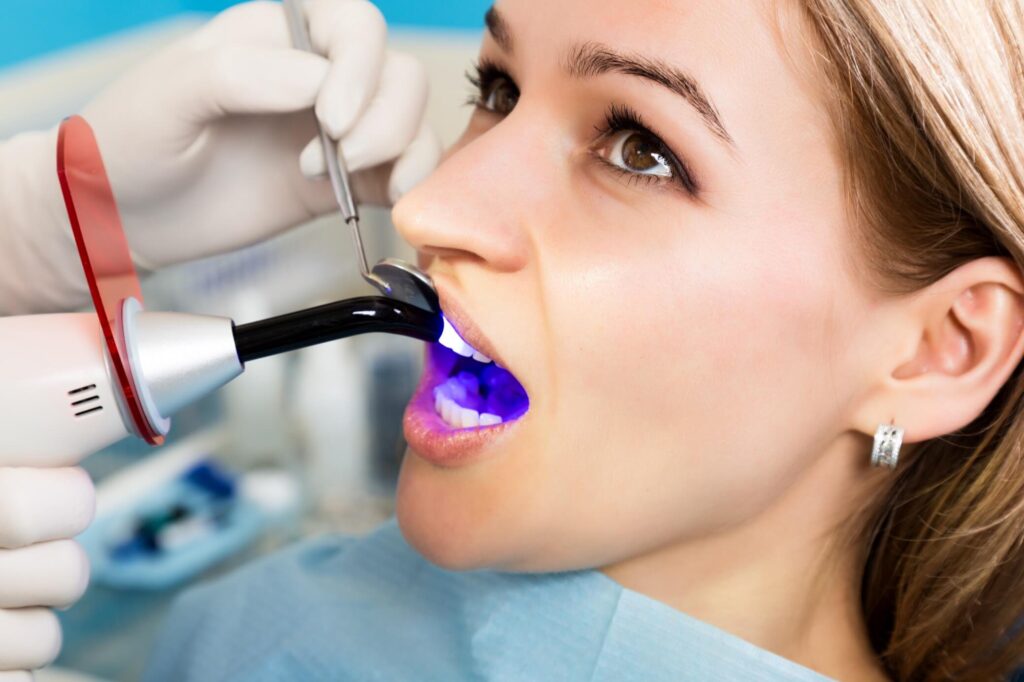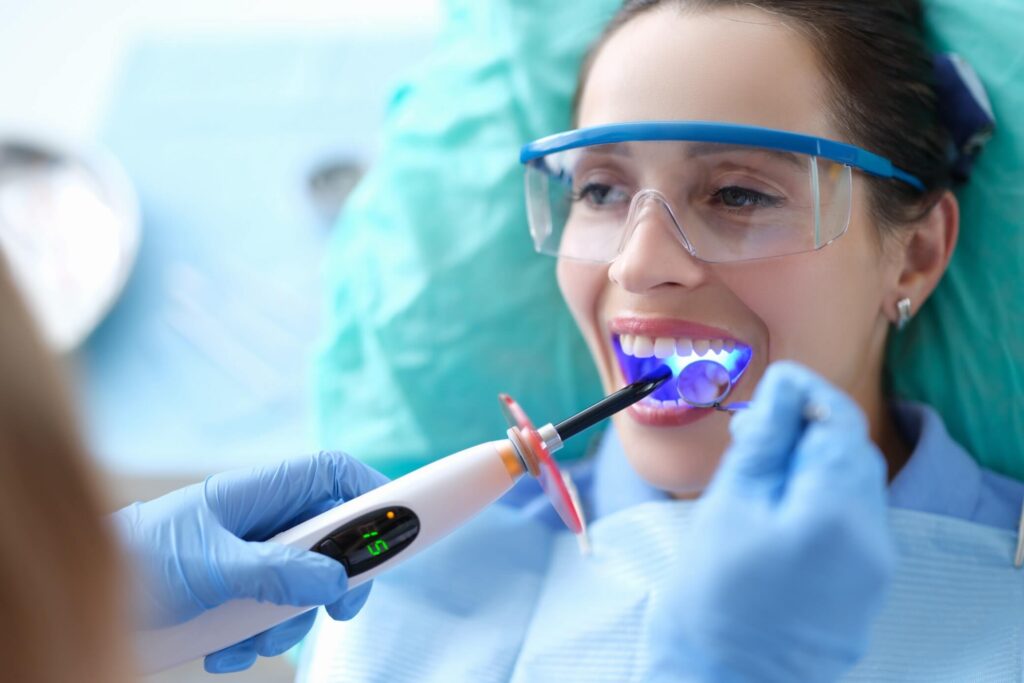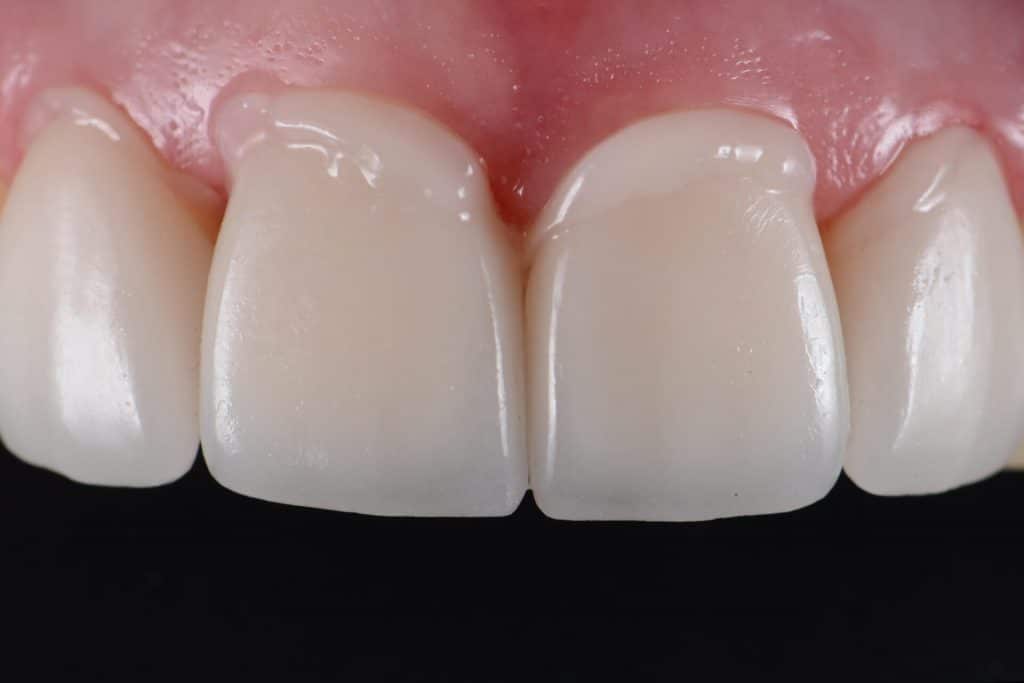Dental Bonding FAQ
The advantage of bonding over dental crowns or porcelain veneers is that it usually requires minimal reshaping or drilling of the original tooth surface. It’s also a faster process, taking only 30 minutes to an hour. You can generally have dental bonding completed in one quick dental visit.
Call Pinnacle Dentistry, your Colorado Springs dentist, today to learn more.
Why Would Someone Get Dental Bonding?
There are several cosmetic and functional uses for dental bonding:
Repairing Chipped or Cracked Teeth
Bonding material can fill chips and cracks in the teeth from injuries or trauma. This restores the tooth structure and prevents further damage or decay to the affected area. Even if the chip or crack is large, bonding can often repair the tooth instead of requiring a crown or cap.
Improve the Appearance of Discolored or Stained Teeth
Teeth can become stained from coffee, tea, wine, smoking, medications, or aging. Tooth-colored bonding material can mask intrinsic stains within the tooth enamel. For superficial stains on the surface, a polishing procedure may be done first before bonding the resin material.
Closing Small Gaps Between Teeth
If you have small gaps between your teeth, dental bonding can fill these spaces. This gives the appearance of more uniform teeth by way of the material bonding to the adjacent teeth on either side of the gap.
Reshaping Uneven Teeth
Teeth that are uneven, oddly angled, or have irregular edges can be reshaped and smoothed using dental bonding. The material is applied and contoured to create a more natural shape and symmetry.
Protecting Exposed Tooth Roots
Gum recession over time can result in more visible tooth roots, which appear longer and can be sensitive. The bonding material acts as a protective seal over the root and hides the darker, exposed portion.

What Does Dental Bonding Involve?
Before your procedure, your dentist will discuss what areas of your teeth will be bonded. They’ll select a composite resin color that matches closely with your natural tooth shade, and they may apply a topical numbing gel to the bonding surface for your comfort. Since minimal drilling is required, local anesthesia (like Novocain injections) is not normally needed.
Dental bonding typically involves the following steps:
Preparation
The tooth surface will be etched by your dentist using a dental drill or acid solution. This process creates microscopic crevices for the bonding material to adhere within.
Application
The tooth-colored bonding resin will be applied to the prepared tooth surface and shaped as needed to form the desired look. The material is somewhat malleable. Your dentist will mold it into natural-looking contours and symmetry with the surrounding teeth.
Hardening
A curing light hardens or “cures” the bonding material. This emits a high-intensity blue light that triggers the resin molecules to solidify and set. This only takes around 30 seconds per area being cured.
Polishing
Once hardened, your dentist will shape and polish the bonding material using refined shaping and polishing tools. The resin is smoothed to blend seamlessly into the natural tooth for an even and glossy finish.

How Long Does Dental Bonding Last?
The longevity of dental bonding varies based on several factors:
Location in the Mouth
On average, with proper care and routine dental visits, composite dental bonding on front teeth can last 5-10 years before needing repair or replacement. Bonding on back molars that endure more chewing forces may only last 2-5 years.
Your Oral Habits
Grinding or clenching your teeth can put more stress on the bonds. Proper brushing and avoiding very hard, sticky foods can help prevent damage.
Bonding Maintenance
Getting bonds polished regularly by your dentist is essential for preservation. Let your dentist know immediately if you notice a bonded area is chipped, damaged, or loose.
How Long Does It Take to Recover From Dental Bonding?
Recovery time from dental bonding is minimal, and most patients can expect to return to regular activity right after their dental visit. Here’s what to expect:
Sensitivity
After bonding, your teeth may be sensitive to hot and cold temperatures for a few days. This is normal and should subside quickly.
Discomfort
You may have mild soreness in the bonding area for the first few days. Usually, just over-the-counter pain medication is needed, if any.
Diet
Avoid chewing on hard food with the bonded teeth for 24-48 hours to allow the resin material to set fully. Stick to soft foods during this time.
Oral Hygiene
Regular brushing is still essential but be cautious around bonded areas for the first couple of weeks until they are fully healed. Avoid using abrasive-whitening toothpaste.
Athletics
Consider using a mouthguard to protect bonded teeth from trauma or fracture during contact sports. Avoid sports for 1-2 days to prevent damage.
Appearance
At first, there may be a slight color difference between the natural tooth and the bonded resin. This should fade in a few days as the material fully settles. Please let your dentist know if any major color discrepancies remain after seven days.
With minimal precautions for the first few days, patients can resume their routine and activities right after dental bonding. Proper oral hygiene and dental visits are vital to ensuring the long-lasting results of your newly improved smile.
Generally, no follow-up is required after routine dental bonding, but you should still check in with your dentist every six months for regular hygiene exams and cleanings.
Generally, no follow-up is required after routine dental bonding, but you should still check in with your dentist every six months for regular hygiene exams and cleanings.
Contact Pinnacle Dentistry Today to Learn More
If you’d like to know more about dental bonding in Colorado Springs, call our friendly team at 719-590-7100.

